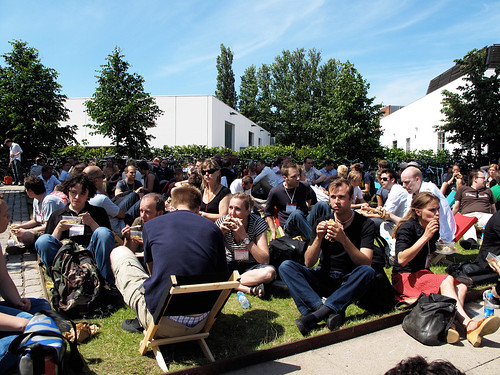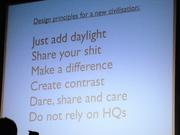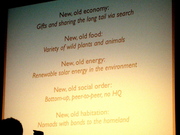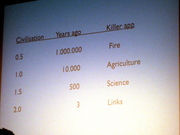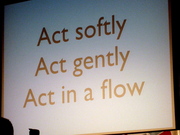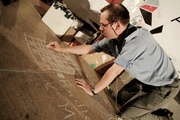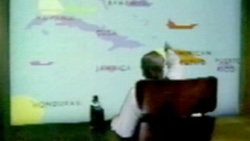reboot11, Copenhagen 2009
- reboot11 home
- 'reboot' on twitter
- 'reboot11' on twitter
- 'reboot11' on flickr
- 'reboot11' on 23
- reboot group on slideshare.net
- reboot group on xing
Day 1
Talks I attended today_
Matt Webb: Scope. design, culture, scale, space, superpowers
Design and contributing to culture; ourselves as individuals and the big picture; taking action.
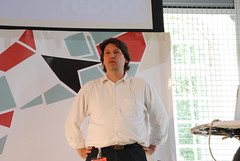 Matthias Müller-Prove: Co-Evolution of Humans and Tools. Shaping our Digital Habitat
Matthias Müller-Prove: Co-Evolution of Humans and Tools. Shaping our Digital Habitat
We should be aware of the fact that we are not just creating our tools but that these artifacts are also shaping us. This is true since the invention of language, writing, the printing press, and more than ever in our digital age of computer and web environments. These are the basis of culture as such, and it is our responsibility to design in a way that supports our life on this planet. BTW_ we neither have another life nor another planet.
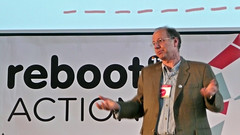 David Weinberger: Cyberutopianism + Activism
David Weinberger: Cyberutopianism + Activism
I'm (embarrassingly) a cyberutopian. I'm going to try to get from there to activism through the most roundabout way possible: By wondering if there's any sense at all in thinking that the Web is morally good. (Yes, I know objects can't be morally good or bad. I'm going to talk about that, too.)
Ack.
Weinberger said, "The architecture of the morality and the web is the same."
Trine-Maria Kristensen: ...and Action! How to convince your BRAIN to actual CHANGE!
You have decided, that you have to change this. Maybe it is your diet. Maybe the way your organization involves customers. Maybe the fact that you don't update your blog regularly. But even though you have made the decision and know what it takes, you still find it hard to take action. Somehow there is always some excuse.
So how do we get from excuse to execution?
I think we should take a look at the way our brain structure supports or rejects our decisions to act! My main point is that understanding the way our brain works might make it easier for us to change and act according to our own will?
- Know your brain – otherwise it can easily fool you
- Motivation – consider a bet with yourself. If I do not… I will sell my house, donate a huge amount of money…
- Nudge yourself – e.g. decorate your home with photos that continuously remind you on your goal.
- Practice
- Focus – If you really want it, take away everything else
- Build bridges – Don‘t leave everything behind.
- Be mindful – Slow down. Listen. Take it in and let it out.
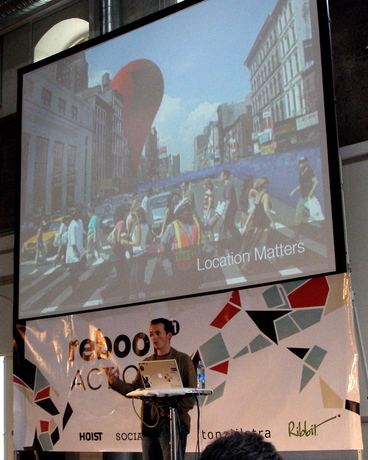 Andrew Turner: Loca(c)tion. Utilizing Place to Enable Action
Andrew Turner: Loca(c)tion. Utilizing Place to Enable Action
Tools that enable anyone to measure, see, and analyze their space around them has allowed communities to connect and work to build better societies. Recovering from devastating hurricanes, upheaving untrustworthy governments, or just making better greenways, geospatial technology is actively being used and advanced by non-experts who care about their space. Neogeography, neocartography, locative media, molososo, context-aware architectures - lots of ideas, but how do they all fit together and actually make a difference? Lets talk about what has worked and not worked, what tools are missing or how we can better connect people with location-based technology and practices.
 Dave Winer: Rebooting The News. Sources Go Direct
Dave Winer: Rebooting The News. Sources Go Direct
The tech industry is cyclic, and it cycles along with the tech press. Only this time we're taking all the press with us on the ride, as technology re-forms how we get the news. Recent events in Iran illustrate how it will work. People think of Twitter, but that's just the surface. It's being used to link blogs, photos, videos, all kinds of metadata. Let's look beyond what Twitter does today. Rebooting in 2009 inevitably involves the reboot of the news.
- David Weinberger blogs
- My rant on twitter: 140 character bullshit:
- davewiner …with the user model. Again, this is engineering #bullshit. #reboot11
- davewiner …charachter limit. Dear software designers, please show a little respect for your users and do not confuse the system model…
- davewiner …tered tweets to maka them at least readable again. A similar UI could create a series of tweets if your reach the technical 140…
- davewiner …for your blurb. If the text gets longer twitter (or any UI that displays the tweets) could simply stitch together the scat…
- davewiner …the twitter medium. A low entry barrier is fine, though. And I also like that you do not have to artificially invent a title…
- davewiner …boundary that makes people feel stupid because they can not limit themselves to a reasonable amount of text that is accepted by…
- davewiner Indeed, the 140 chars limit is "bullshit" from the usabiltiy point of view. There is no technical reason te keep this hard…
- RT davewiner Steve Gillmor says 140 chars is plenty. I don't have the nefarious motives he suggests, I just feel cramped… http://tr.im/pJaI
Tor Nørretranders: The traditionel reboot evening talk
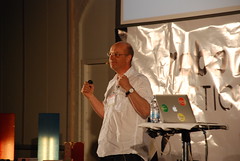
That guy with the mustache
Day 2
I missed Euan Semple's Big Picture in the morning – 'was chatting with Bruce Sterling instead.
 Lee Bryant: Twenty-first Century Stories. What have we learned at Reboot that will shape action in the C21st?
Lee Bryant: Twenty-first Century Stories. What have we learned at Reboot that will shape action in the C21st?The Twentieth Century was characterised by a dehumanising approach to the organisation of people. People as mass, mass marketing, Taylorism, etc.
The first 10 Reboots have provided some interesting suggestions about how we rebalance the relationship between people and institutions. Might be interesting to reflect on what this tells us about the way forward.
 Ole Qvist-Sørensen: building spaces with pen, paper and curiosity...how visual thinking and practice is a difference that makes a difference
Ole Qvist-Sørensen: building spaces with pen, paper and curiosity...how visual thinking and practice is a difference that makes a differenceI have always liked to draw. We all once knew how to visually depict our thinking. Somewhere in school most people lost it. Today I help teams get to a shared picture of complex issues - such as business strategy and vision and climate change impact. I also help project managers and leaders to think visually again and use this skill in daily communication where engagement of employees is key. In this session we will explore a bit of the simple stuff which enables collaborative platforms - offline.
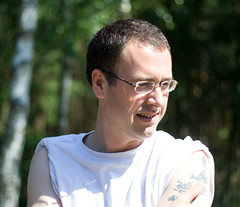 Peter Kaptein: RoomWare in action. Making places interactive and alive
Peter Kaptein: RoomWare in action. Making places interactive and aliveWe have reached the tipping point where everyday hardware and infrastructure makes it possible to start interacting with our surroundings and get concrete feedback from that surroundings ("where is ..?" "what can you offer me?" "What can you tell me about..")
In our talk we will inspire you with what is possible today and we will show you how to make interactive, caring and living spaces possible with low budget technology you are already using as we speak.
We will discuss things like Personal DataClouds, Location- and Object Tagging, Personal Timelines, the several ways to bookmark People, Places and Moments, use Reboot as a living case and discuss how to relive those moments later thanks to all the meta-data produced by you and others using services like Flicker, Twitter, YouTube and whatever else there is.
JP Rangaswami: Walking the talk. Voice in action

The human voice is a rich and complex output orchestrated by larynx, lung and vocal folds, augmented by lip and tongue. Individually and collectively, voice is used to converse, to sing, to convey emotion, to spur to action. To be authentic.
It's always been a synchronous form of communication; now, in a digital world, it has become asynchronous as well. Voice has been around a long time. It's been around since man's been around. With the advent of social tools, and with the advance of digital technologies, there's a lot happening with voice. Has this helped or hindered? Will it help or hinder? How can we retain the humanness, the authenticity, the passion, that which makes voice something we treasure?
Jens-Christian Fischer: The Art of Doing. or what fractals and martial arts can teach us about action
Taking action is the basis of all progress. While some things are bound to happen, change and progress come from people taking action.
This talk, "The Art of Doing" explores concepts of nature, fractals, energy, martial arts to derive at a look of how we can do things and make a difference
Stowe Boyd: New Spatialism. A More Humane Social Space On The Web
More of our social interaction in moving from the primitive but relatively open and egalitarian world of the blogosphere onto a set of closed or at least controlled applications. How can we -- as a community or culture -- influence actions or product decisions that companies like Apple, MySpace, Twitter and YouTube are taking that could 'enclose the commons' and disrupt or rework the Web that we have been making?
Some of my concerns are about about making a social space that remains ours, and becomes more humane over time. That's why I am calling for a movement -- like New Urbanism in city planning -- bringing together designers, investors, developers, users, and thinkers, to make sure we can rethink social tools based on what does and does not work today, and based on principles that engender the world we want.
But my deepest worries are about ownership and governance, and the tensions between us, the denizens of the web, and those that own the means of connection. We have to plan how to take back the web that we animate, that we make valuable by our actions.
Bruce Sterling
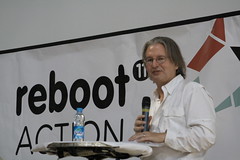
- Back to the Future – The Way to a Personal Dynamic Medium for Creative Thought /reboot 7, 2005
- A Duel Between Desktop and Web /reboot 9, 2007
- Co-Evolution of Humans and Tools /reboot 11, 2009
- A Chat with Doug Engelbart at reboot7 | reboot7 highlights | reboot7 all topics
- reboot8 highlights
- reboot9 highlights
- reboot11 highlights | Meditation from reboot11 by mardahl
- Raum Schiff Erde Mediathek /since 2010
- Algorithmische Philosophie – Hildesheimer Trilogie in 4 Teilen /2015-18
Copenhagen Reboot Trilogy
Presentations at reboot convention between 2005 - 2009
More on reboot:
In the tradition of reboot:

